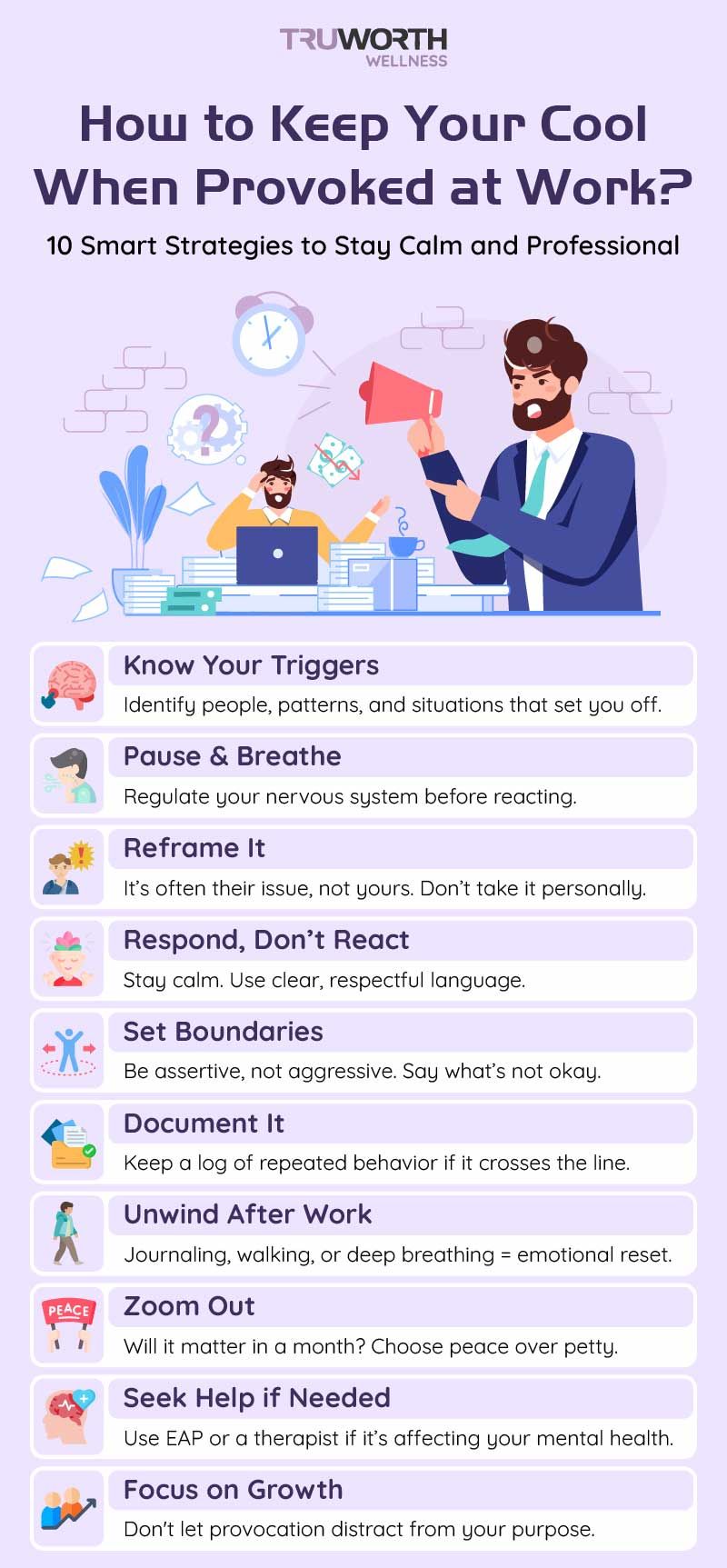How To Keep Your Cool When You're Constantly Being Provoked At Work?

Even in the most professional environments, emotions can run high. Deadlines, ego clashes, miscommunication, or even subtle power plays can lead to a situation where you feel repeatedly provoked at work. Whether it’s a colleague who constantly undermines you, a manager who nitpicks, or a team member who communicates with passive-aggression, being constantly triggered can affect your performance, mood, and overall well-being.
But here’s the thing: you can't always control what others say or do, but you can control your response. And that’s where your power lies.
Here’s how to keep your cool and maintain your emotional equilibrium, even when your patience is being tested daily.

1. Recognize the Pattern and the Provoker
Start by identifying what's bothering you. Who or what is consistently triggering your emotional response?
- Is it a tone of voice?
- Is it a particular type of comment or criticism?
- Is it a person who dismisses your ideas or interrupts you in meetings?
Recognizing patterns helps you detach and assess the situation more objectively. It allows you to stop reacting impulsively and start responding thoughtfully. A journal or a private log of incidents can be useful in making sense of repeated behavior that might otherwise seem random or emotionally overwhelming.
2. Regulate Your Breathing, Regulate Your Emotions
One of the quickest ways to anchor yourself when provoked is to return to your breath. When you're triggered, your body activates a stress response—your heart races, your muscles tense, and your breathing becomes shallow.
Combat this by:
- Inhaling deeply through your nose for four seconds,
- Holding your breath for four seconds,
- Exhaling slowly through your mouth for four seconds.
This simple technique, called box breathing, helps reset your nervous system and gives your brain a moment to choose a calm, rational response over an emotional outburst.

3. Reframe the Situation Mentally
Sometimes, people provoke you not because they are truly against you, but because they are struggling with their own issues—stress, insecurity, or lack of self-awareness. While this doesn’t excuse poor behavior, it gives you perspective.
You might say to yourself:
- “This comment says more about them than it does about me.”
- “I refuse to let this person dictate how I feel today.”
Reframing helps you avoid personalizing the situation and keeps you from spiraling into unnecessary self-doubt or anger.
4. Respond—Don’t React
There’s a big difference between reacting and responding. Reactions are instant, emotionally charged, and often regrettable. Responses are thoughtful, measured, and rooted in self-respect.
For instance, if a coworker speaks rudely to you, resist the urge to fire back. Instead, calmly say:
- “Let’s keep this conversation respectful.”
- “I’d prefer if we spoke constructively.”
- “Can we revisit this later when we’re both calmer?”
You’ll earn more respect and maintain your peace when you choose not to mirror their negative behavior.
Also Read: Why Should You Incorporate Emotional Intelligence In The Workplace?
5. Set Clear Boundaries
Sometimes, people keep provoking you because you haven’t made it clear where your boundaries lie. If a colleague often jokes at your expense or takes credit for your work, you need to assert yourself.
This doesn’t mean being confrontational. It means being assertive. For example:
- “I noticed you made a comment that felt a bit personal. Please avoid that in future discussions.”
- “I worked on that presentation, and I’d appreciate being acknowledged for it.”
Clear boundaries often reduce repeated offenses—and even if they don’t, you’ll feel more empowered for standing up for yourself.
6. Document, Especially If It’s Repeated or Harassing Behavior
If someone’s behavior is consistent and harmful, begin documenting what happens. Note:
- Dates and times of incidents
- Direct quotes or behaviors
- Any impact on your work or well-being
Witnesses, if any
Having a written record can help you present a factual case to HR or a supervisor, especially if the situation escalates. This protects you and also shows you’ve tried to handle the situation maturely before escalating it further.
7. Create Emotional Recovery Time After Work
Holding in your emotions all day doesn’t mean they disappear—they simply pile up. If you're frequently provoked, build time into your routine for emotional recovery:
- Go for a walk after work
- Vent to a friend or family member
- Journal your thoughts to process them privately
- Practice yoga or deep stretching
- Listen to music or podcasts that calm your mind
This post-work recovery helps you reset and prevents emotional fatigue from snowballing over time.
8. Consider the Bigger Picture
Ask yourself:
- “Is this person worth my peace?”
- “Will I care about this in a week, a month, a year?”
- “Is my reaction helping or hurting me?”
Looking at things from a broader perspective often reduces the emotional weight they hold in the moment. It also helps you decide whether to engage, walk away, or simply let go.
9. Seek Help if It's Too Much
Sometimes the provocation isn't just annoying—it's mentally and emotionally damaging. If you feel overwhelmed, anxious, or demoralized because of how someone is treating you at work, speak to a counselor or use your company’s Employee Assistance Program (EAP) if available.
Mental health support can provide you with practical tools and emotional validation, especially when you feel stuck or helpless in a toxic environment.
10. Focus on Your Growth and Energy
Lastly, remember why you’re at work: to learn, grow, and contribute meaningfully. Don’t let someone else’s negative energy derail your goals.
Pour your energy into:
- Skill-building
- Networking with supportive peers
- Engaging in projects you enjoy
- Setting personal professional goals
The more grounded you are in your purpose, the less sway provocations will hold over you.
Final Thoughts: Calm Is a Strength, Not a Weakness
Staying calm when provoked doesn’t make you passive—it makes you powerful. In a world full of reactive people, the ability to hold your ground, respond with grace, and protect your peace is a superpower.
And while it’s not always easy, it is always worth it.
So the next time someone tries to throw you off balance, remind yourself:
“I don’t rise to provocation—I rise above it.”
